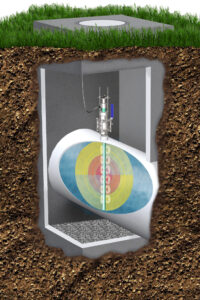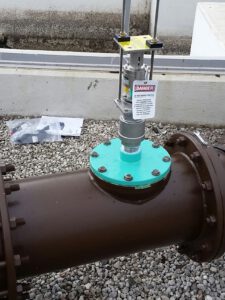The Columbia Improvement District (CID) in Boardman, Oregon, is working to maximize the capabilities of its water infrastructure with the goals of improving system efficiency and reliability to better serve district members. CID General Manager Mark Maynard has led an initiative to automate and improve efficiency throughout the CID system. The installation of McCrometer FPI Mag meters has been a critical component of that effort.
Situated off the southern banks of the Columbia River, CID provides water to 18,000 acres of farmland via a 7-mile main canal, 6 pumps off the Columbia River, 30 booster stations, and a large network of pipelines throughout the area. On average, CID pumps 76,000 acre-feet of water from the Columbia every year. Farmers in district grow potatoes, onions, sweet corn, and peas.
 Two of the biggest challenges for the district are balancing out system water during the peak of the irrigation season and preventing any breakdowns of the pump system. According to Mr. Maynard, “Our pumps are getting old: We just recently had to replace our river pumps, and the pumps in the boosters are showing their age. It is hard to keep them up and running in July and August. In addition, it is difficult to run our pumps efficiently.”
Two of the biggest challenges for the district are balancing out system water during the peak of the irrigation season and preventing any breakdowns of the pump system. According to Mr. Maynard, “Our pumps are getting old: We just recently had to replace our river pumps, and the pumps in the boosters are showing their age. It is hard to keep them up and running in July and August. In addition, it is difficult to run our pumps efficiently.”
The CID board identified old propeller meters as a source of those ongoing challenges. The meters needed to be upgraded to increase accuracy and dependability and to decrease maintenance costs. At the end of last year, at the behest of his board, Mr. Maynard issued a request for bids on the replacement of district flow meters with the goal of installation and operation prior to the start of the irrigation season in March. The district was looking to retrofit 25 meters on pipes ranging from 12 inches to 34 inches in diameter.
CID selected McCrometer FPI Mag devices in December, a mere 21/2 months before they were to start running water through the system. Dick McDougal, McCrometer’s Pacific Northwest regional sales manager, explained that the FPI Mag meters are magnetic flow meters with coils and electrodes assembled in a tube that can be inserted into a pipe perpendicular to its flow stream.
One of the reasons CID selected the FPI Mag meters was the ease of installation. Mr. Maynard explained, “The only thing we had to upsize was our conduit, but that was very minimal. The other companies would have required us to dig up the pipe to install the meters, incurring tremendous installation costs.” The ease of meter installation and the ongoing communication between CID and McCrometer enabled the district to meet its March deadline.
According to Mr. Maynard, use of the new meters required “some training, but not a tremendous amount. I have one employee that has been here for many years, and the other three have been here for less than 2 years, so they have always been learning. They have picked up on the use of the new meters well.”
The results of the implementation have been positive. Mr. Maynard reports that the accuracy of flow readings has improved. “We are getting accurate readings, which we can read on a cell phone or tablet from anywhere.” In addition, because most of the flow in CID’s canal system is on its east end, improved accuracy of flow rates has enabled CID to adjust its gates to balance that out easily and efficiently.
 Mr. Maynard reported, “Before, we were probably overflowing the canal once a week, wasting a fair amount of water. So far this year, we have not had any overflows in the system.” Accurate information is provided immediately to the mobile devices of CID staff, adding stability to the delivery system and accuracy to billing statements.
Mr. Maynard reported, “Before, we were probably overflowing the canal once a week, wasting a fair amount of water. So far this year, we have not had any overflows in the system.” Accurate information is provided immediately to the mobile devices of CID staff, adding stability to the delivery system and accuracy to billing statements.
Improved readings have translated to improved on-farm efficiencies. Mr. Maynard said, “One of our farmers runs a small center pivot with a 940-gallon nozzle package off one of our smaller pump stations. I was amazed that the readings from the pumps nearly matched up with the flow package on the pivot. For years, the flow readings on the pump station were not close to the farmer’s readings. The station was always off. This year, the two readings are almost neck and neck.”
McCrometer’s Mr. McDougal explained, “Farmers are going to get a real, true flow reading. They will be paying for what they are really using.”
Overall, the change CID pursued has already been successful. The accuracy and ease of use of the FPI Mag meters has encouraged the district to explore additional automation options with the potential for creating more system certainty and opening up the possibility of district expansion.
